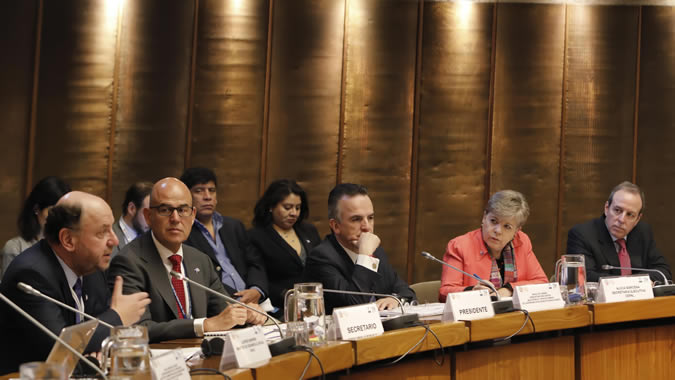
16-20 Apr 2018 Santiago, Chile | Forum of the Countries of Latin America and the Caribbean on Sustainable Development

Compliance with the 2030 Agenda for Sustainable Development must be State policy and its implementation must form part of the programs of the new governments that are taking power in the region, said authorities gathered today at the second meeting of the Forum of the Countries of Latin America and the Caribbean on Sustainable Development, which is being held through Friday, April 20 at ECLAC’s central headquarters in Santiago, Chile.
During the second day of the Forum, authorities participated in a peer learning session where they addressed continuity in the implementation of the 2030 Agenda and new challenges in light of the changes in government that the region is undergoing. The session was led by Miguel Ruiz Cabañas, Undersecretary for Multilateral Affairs and Human Rights at Mexico’s Secretariat of Foreign Affairs, and Alicia Bárcena, ECLAC’s Executive Secretary.
The panel was moderated by Alfredo Moreno, Minister of Social Development of Chile, and the panelists included Olga Marta Sánchez, Minister of National Planning and Economic Policy of Costa Rica; Enrique Villa da Costa, National Secretary for Social Coordination of the Government Secretariat of the Office of the President of Brazil; and Raúl Montiel, Coordinator of the Environment Affairs Unit at Paraguay’s Ministry of Foreign Affairs.
During his talk, Alfredo Moreno indicated that the Sustainable Development Goals “are a responsibility of the State and not of the government, which implies that officials should take what was being done and build on it.”
The Minister highlighted the importance of the SDGs, especially Goal 17, which calls for revitalizing the Global Partnership for Sustainable Development and which “is very important primarily for forging ties with other actors, such as civil society and the private sector.”
“In the case of Chile, we are going to determine what the country’s main problems are in order to later invite not just the government, but also civil society, the private sector and also academia” to dialogue about implementation of the 2030 Agenda, he said.
Minister Olga Marta Sánchez, meanwhile, underscored that the 2030 Agenda “rallies us around a rights-based approach and obligates us to eliminate our development gaps.”
“States are not the only ones in charge of moving the Agenda forward, and that is why it is so important to incorporate the participation of all actors: governments, the private sector and civil society,” she stated.
She emphasized that in Costa Rica there is an interest in institutionalizing these processes, which is very important in the context of an imminent change in government.
Enrique Villa da Costa, for his part, agreed that internalizing the 2030 Agenda is an effort made by the State, not the government, and stressed that the idea is to reproduce a model of national governance in states and municipalities.
He highlighted the importance of the Agenda’s diffusion and the formation of alliances “not only international ones, but also within the country itself.”
He added that Brazil “has a very big opportunity with the 2030 Agenda.”
Raúl Montiel, meanwhile, affirmed that only through a participatory process will all the targets of the SDGs be able to be fully achieved in Paraguay.
“In that gender equality is extremely important. Sustainable development is not possible without the fair participation of all women,” he indicated.
He also underscored that his country’s main challenges are “to disseminate, popularize and raise awareness among the vast majority of the population, which is still detached from the 2030 Agenda.”
During the day, there was also an interregional dialogue between Latin America and the Caribbean and Europe on implementation of the 2030 Agenda for Sustainable Development, and the regional dimension of the global agenda as well as the contributions of the United Nations system were also analyzed. In addition, participants addressed multi-stakeholder contributions to the implementation of the 2030 Agenda.
The Forum of the Countries of Latin America and the Caribbean on Sustainable Development will conclude on Friday, April 20, with dialogues on the shift toward sustainable and resilient societies and a briefing on regional progress regarding the global compact for safe, orderly and regular migration. A special session on artificial intelligence will also be held before the gathering finalizes with the conclusions and recommendations of the second meeting of the Forum.